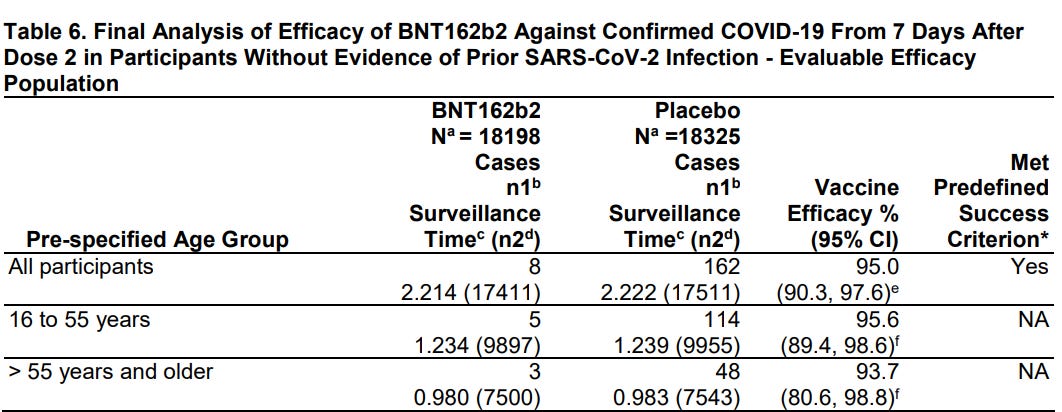Is the Pfizer vaccine only good at producing a negative PCR-test and not that good at reducing the risk of severe covid?
-If looking at all participants that got sick with symptoms of covid-19 in the Pfizer study, vaccine efficiancy would be 19-29 %
This is a text from the FDA-report at page 42, looking at Pfizers initial vaccine-study, publishing some important complementary data.
The first thing that I think is very interesting here is that there are 3410 cases of suspected but unconfirmed covid-19 cases. Meaning people with symptoms of covid-19 but a negative PCR-test. 3410 people got sick out of roughly 44 000 participants. 1816 in the placebo group and 1594 in the vaccine group. Not really a big difference between the group.
But when we introduce a PCR-test, to test for covid-19, we only find 170 participants with symptoms of covid-19 AND a positive PCR-test, 8 in the vaccine group and 162 in the placebo group. This is what the vaccines efficiancy calculation is based on. VE = (162-8)/162 = 95 % effective.
If we insted calculated vaccine effectiveness in reducing the risk of getting sick with symptoms of covid-19, also including participants with symptoms of covid-19 but a negative PCR-test. We get VE = (1816+162-1594-8)/(1816+162) = 19 %.
So the Pfizer vaccine actually has a relative risk reduction of 19 % of the participants getting sick with covid-19 symptoms.
As you can see in the first picture quite a lot of the covid-like illness occured during the first 7 days after the shot which could be due to an adverse event from the vaccine, with overlaping symptoms of covid-19. But even if we correct for the first seven days we still get a very weak VE of about 29 % (1816-287+162-1594+409-8)/(1816-287+162) in reducing the risk of getting sick with covid-like illness.
That makes me wonder:
Only 170 participants got sick with covid-19 symptoms AND tested positive with a PCR-test compared to 3410 participants got sick with covid-19 symptoms but got a negative PCR-test. That means that less than 5 % of all people getting sick in this trial tested positive for covid-19. We could conclude from this that if we want to keep people out of the hospitals we should definitely focus on the 95 % of people sick with covid-19 symptoms but with a negative test. The small minority of less than 5 % sick with the same symptoms but a positive PCR-test are not as important.
The covid-vaccines seem effective in producing a negative PCR-test in people with covid-symptoms but not so effective in reducing covid-like illness and keeping people out of the hospitals?
But what about confirmed serious covid-19 infections in the trials?
According to the picture below there are 3 serious cases of covid-19 in the placebo group and only 1 in the vaccine group. Of course the vast majority of cases discussed above do not end up in a hospital setting, but serious covid-19 events most likely do.
Are the vaccines still reducing the risk of getting serious covid-19 if we include the serious events of suspected covid-19 (symptoms but a negative PCR-test)?
As you can see if we include the serious events from people with symptoms of covid-19 but a negative PCR-test there are 2 in the vaccine group and zero in the placebo group.
Meaning the chances of getting serious covid-19 symptoms and ending up in a hospital setting is the same in the vaccine (3 serious cases) and in the placebo group (3 serious cases).
Can we really be sure that the covid-vaccines reduce severe cases of covid-19 and reduce hospitalization and death due to covid-19 if we instead look at all sick people, all people with covid-symptoms rather than the outcome of a PCR-test?
Or maybe more importantly: Can we be sure that recommending someone to take the covid-vaccines will reduce their chance of ending up in a hospital setting- or dying of all causes?
If you want to read more in depth on this topic, I would highly recommend Chris Masterjohn's substack blog, which brought my attention to this.
He calls it: -Explaining the “Hospitalization Paradox".
What do you think?




